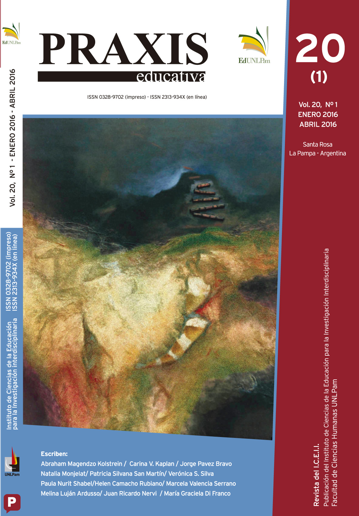Relación con el saber y lenguaje escrito en estudiantes de quinto y noveno grado de dos instituciones públicas del Departamento del Valle del Cauca, Colombia / Relation to knowledge and written language in 5th and 9th grade students in two public institu
DOI:
https://doi.org/10.19137/praxiseducativa-2016-200105Palavras-chave:
relación con el saber, lenguaje escrito, relación epistémica, relación identitaria, estudiantes de educación básica.Resumo
El propósito de esta investigación fue conocer la relación con el saber en sus dimensiones epistémica e identitaria que estudiantes de quinto y noveno grado de educación básica establecen con el lenguaje escrito. Este fue un estudio exploratorio, con una aproximación hermenéutica. Participaron 105 estudiantes de quinto y noveno grado de dos Instituciones Públicas del Departamento de Valle. Los hallazgos mostraron que la mayoría de los estudiantes presentaron una relación epistémica e identitaria poco consolidada con el lenguaje escrito. En lo epistémico, los estudiantes realizaron pocas evocaciones sobre los aprendizajes intelectuales relacionados con la escritura; y mostraron dificultades en el dominio de la escritura: errores en la puntuación, ortografía, construcción de las frases y estructuración de ideas. En lo identitario, los estudiantes no realizaron evocaciones que dieran cuenta del sentido y el valor de la escritura para su desarrollo intelectual y personal. Estos resultados evidencian la necesidad de promover situaciones didácticas para la enseñanza y aprendizaje de la escritura centradas en los estudiantes, en sus expectativas y en su red de relaciones con el saber y el aprender.
Downloads
Downloads
Publicado
Edição
Seção
Licença
Aviso de direitos autorais
Comitê Editorial Revista Práxis Educativa:
Declaro que sou o autor do artigo intitulado (nome do artigo), que o mesmo é original e de minha autoria e que não foi publicado anteriormente em qualquer outro formato ou meio. Declaro saber que a revista não me cobrará nenhum tipo de taxa em hipótese alguma, nem receberei qualquer tipo de remuneração monetária.
Caso seja aceito para publicação na Práxis Educacional, autorizo a referida revista a publicá-lo digitalmente e a divulgá-lo em suas redes sociais.
Se o trabalho for publicado, aderi à licença Creative Commons denominada "Atribuição - Compartilhamento Não Comercial pela mesma Licença CC BY-NC-SA", por meio da qual é permitido copiar, reproduzir, distribuir, comunicar publicamente o trabalho e gerar trabalhos derivados , desde que o autor original seja citado e reconhecido. Esta licença está em uso desde setembro de 2018. Em 2016 foi aderido ao CC BY NC ND 4.0; e nos anos de 2017 e 2018 (janeiro-agosto) CC BY NC 4.0.
Esta licença CC BY-NC-SA Share Alike não permite, entretanto, o uso comercial da obra. Como autor, a revista poderá estabelecer acordos adicionais para a distribuição não exclusiva da versão do trabalho publicado na revista, permite-me autoarquivar os artigos publicados, na sua versão post-print, em repositórios institucionais, temáticos , páginas web pessoais ou qualquer outro uso relevante. com o reconhecimento de ter sido publicado pela primeira vez nesta revista.
SA Práxis Educacional adere à DORA (Declaração sobre Avaliação de Pesquisa) assinada em São Francisco, Califórnia, em 16 de dezembro de 2012, e à Declaração do México (Declaração Conjunta LATINDEX - REDALYC - CLACSO - IBICT).















_(1)2.png)


3.png)











_(2).png)






2.jpg)









